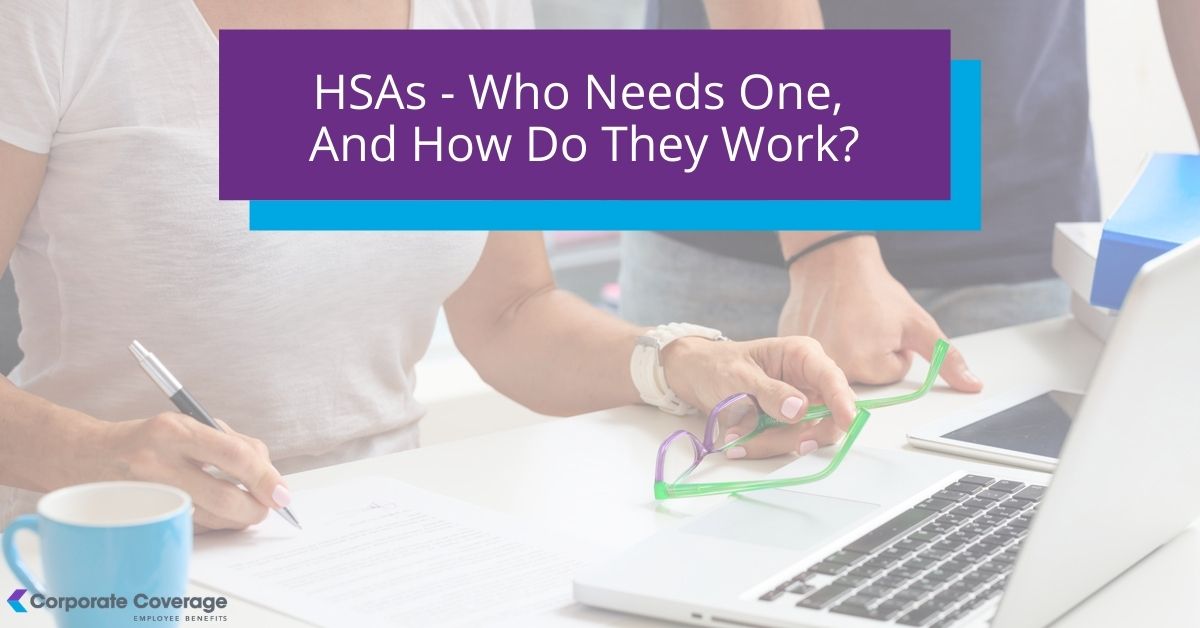HSAs – Who Needs One, And How Do They Work?

You may have heard of High Deductible Plan Options that come with an HSA (a health savings account), and you may even offer them as part of your employee benefits package. But many employers are unsure exactly of what those terms mean, and why their employees would be interested in those plans. Corporate Coverage’s Heather Charlebois covered the topic on the Atlantic Financial FCU’s Financial Power Podcast. Continue reading for the highlights, or click here to listen to the podcast.
What is an HSA?
An HSA is a special bank account that can be opened if someone is enrolled in an HSA qualified High Deductible Health Plan. Money set aside into this account is a pre-tax savings when made via payroll deductions or taken as a top-line tax deduction on a person’s tax return when made with post-tax deposits. The money in this account can then be used to pay for out-of-pocket expenses such as medical, dental, and vision plus any expenses listed in the IRS publication 502. As an employer offering an HSA, you are giving your employees the option to save tax dollars and prepare for their expected or unexpected out-of-pocket expenses such as deductibles.
Is your plan HSA qualified?
An HSA qualified plan has to have a minimum deductible of $1400 for individuals and $2800 for families. Other than preventive care, there can’t be any benefits that are not subject to the deductible, and the deductible is combined for medical and prescription. But not all plans that have these deductibles are HSA qualified. Please check with your broker or insurance company to be sure. Most often the name of the plan will include “HSA” in it just to let you know.
Why would someone want an HSA? What’s the benefit to individuals?
It’s all about the tax savings! While employees can enroll in an HSA-qualified plan even if they do not want to contribute to one because of the deductible, HSA plans can cost less than similar traditional plans.
But those that do open one up will see tax savings. If you allow the employees the convenience of payroll deductions into the plan, you will save on taxes that are based on payroll.
Can you and your employees both contribute to the HSA?
You sure can! If you want to contribute to an employee’s HSA, that’s a great benefit to them. The IRS does limit the amount that can be contributed and that amount would be a combination of both employer and employee contributions. Be aware that as soon as you make an employer deposit into an account, the money belongs to the employee regardless of continued employment.
How much can be contributed to the account?
The 2021 numbers are out: $3600 for individual, $7200 for families, and $1000 extra for employees over 55.
Along with tax deductions often comes rules. Is there a possibility of losing money with an HSA?
One of the big misconceptions about HSAs is that the money is lost at the end of the year. Unlike Flexible Spending Accounts (FSAs) or Health Reimbursement Accounts (HRAs), the HAS is truly a savings account.
With an HSA, the money stays in there until used. Depending upon which bank is used, the account is usually interest-bearing and allows for investment options above a certain minimum balance.
Can money be withdrawn from an HSA for a non-qualified expense?
It can be, but the employee would be required to pay the tax that was avoided, plus a 20% penalty. That penalty goes away at age 65. At 65 or older, if used for eligible expenses, the tax would be avoided forever! If used for non-eligible expenses, the tax would be paid but no penalty will be applied
How are claims filed?
There are no claims to be filed for withdrawals from the HSA. The accounts typically provide a debit card, online bill pay, and checks (usually for a fee). Receipts need to be kept for expenses paid from the account in the event of a personal IRS audit.
What happens if an employee changes health plans to a non-HSA plan or terminates employment.
Once an individual switches to a non-HSA plan, they can still continue to use any money that’s in that account, but they can no longer contribute money to the account. If the employee terminates, they can keep the HSA account and continue to use the funds. They can also transfer the funds to another HSA bank if desired.
Want to get started with HSA accounts? Click here to reach out and begin the process today!